Related Research Articles

The Last Page, released in the United States as Man Bait, is a 1952 British film noir directed by Terence Fisher, starring George Brent, Marguerite Chapman and Diana Dors. The film was also known as Murder in Safety and Blonde Blackmail.
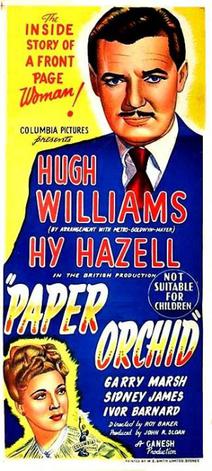
Paper Orchid is a 1949 British crime film directed by Roy Ward Baker, with a script written by Val Guest. It featured Hugh Williams, Hy Hazell and Garry Marsh, and was based on the 1948 novel of the same title by Arthur La Bern. It featured an early film appearance by Sid James, who later found success through the Carry On series.

Breakaway is a 1955 British thriller film directed by Henry Cass from a script by Norman Hudis. It stars Tom Conway, Michael Balfour and Honor Blackman. A private eye is hot on the tail of a stolen secret formula and a kidnapped young woman. It is a sequel to Barbados Quest.
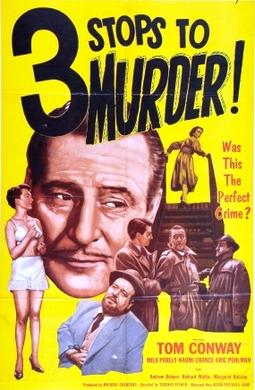
Blood Orange is a 1953 British crime film directed by Terence Fisher and starring Tom Conway and Mila Parély. It was released in the United States as Three Stops to Murder. A private eye investigating a jewel robbery at a London fashion house finds himself involved in a murder mystery.

Stolen Assignment is a 1955 British comedy 'B' film directed by Terence Fisher and starring John Bentley and Hy Hazell. It was produced by Francis Searle for Act Films Ltd and was a sequel to Fisher's Final Appointment (1954), featuring sleuthing journalists Mike Billings and Jenny Drew.

The Last Man to Hang? is a 1956 crime film directed by Terence Fisher and starring Tom Conway and Elizabeth Sellars. It was produced by John Gossage for Act Films Ltd.

It's Not Cricket is a 1949 British comedy film directed by Alfred Roome and starring Basil Radford, Naunton Wayne, Susan Shaw and Maurice Denham. It is the second of two starring films for Radford and Wayne who appeared as supporting players in ten other films. It was also one of the final films made by Gainsborough Pictures before the studio was merged into the Rank Organisation.

The End of the Line is a 1957 British second feature crime film directed by Charles Saunders and starring Alan Baxter, Barbara Shelley, Ferdy Mayne and Jennifer Jayne. It was released in the USA in 1959.

The Lost Hours is a 1952 British film noir directed by David MacDonald and starring Mark Stevens, Jean Kent and John Bentley. It was produced by Tempean Films which specialised in making second features at the time, and marked Kent's first descent into B films after her 1940s stardom. It was shot at Isleworth Studios and on location around London. The film's sets were designed by the art director Andrew Mazzei. It was released in the United States the following year by RKO Pictures as The Big Frame.
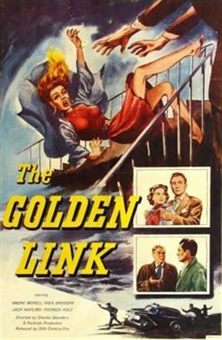
The Golden Link is a 1954 British police drama film directed by Charles Saunders, starring André Morell, Patrick Holt, Thea Gregory and Jack Watling. It was produced by Guido Coen under his Kenilworth Film Productions, featuring a screenplay by Allan MacKinnon and soundtrack by Eric Spear. The story concerns the death of a young woman, having fallen to her demise inside an apartment building. A policeman neighbour, Superintendent Blake, conducts an unofficial investigation, which initially seems to implicate his own daughter in a murder plot.
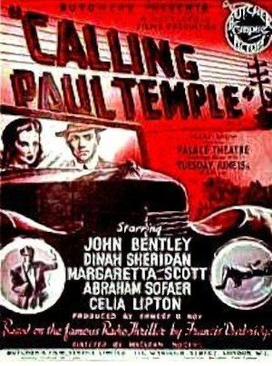
Calling Paul Temple is a 1948 British crime film directed by Maclean Rogers and starring John Bentley, Dinah Sheridan and Margaretta Scott. It was the second in a series of four Paul Temple films distributed by Butcher's Film Service. The first was Send for Paul Temple (1946), with Anthony Hulme as Paul Temple. John Bentley then took over the role in Calling Paul Temple, continuing for two further films: Paul Temple's Triumph (1950) and Paul Temple Returns (1952). It was produced by Ernest G. Roy at the Nettlefold Film Studios in Walton On Thames.
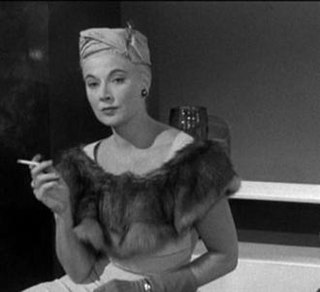
Hyacinth Hazel O'Higgins, stage name Hy Hazell, was a British actress of theatre, musicals and revue as well as a contralto singer and film actress. AllMusic described her as "an exuberant comic actor and lively singer and dancer". A pretty brunette, with long legs, she was billed as Britain's answer to Betty Grable.

Trouble with Eve is a 1960 British second feature comedy film directed by Francis Searle and starring Hy Hazell, Sally Smith, Robert Urquhart and Garry Marsh. It was based on the play Widows are Dangerous by June Garland. It was shot at Walton Studios. The film was released in the U.S. in 1964 as In Trouble With Eve.
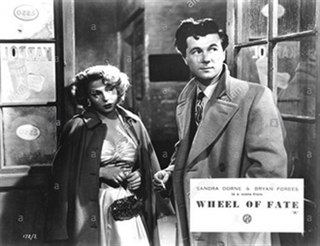
Wheel of Fate is a 1953 British drama film directed by Francis Searle and starring Patric Doonan, Sandra Dorne and Bryan Forbes. The screenplay concerns a man who turns to crime to raise the money he needs to spend time with a woman with whom he falls in love. It was produced as a second feature and shot at Riverside Studios in London. The film's sets were designed by the art director Wilfred Arnold. It was released by Rank's General Film Distributors.

Never Look Back is a 1952 British drama film directed by Francis Searle and starring Rosamund John, Hugh Sinclair and Guy Middleton. The screenplay concerns a newly appointed female barrister whose career is threatened by a former lover. It was made by Hammer Films at the Mancunian Studios in Manchester.

Night Was Our Friend is a 1951 British drama film directed by Michael Anderson and starring Elizabeth Sellars, Michael Gough and Ronald Howard. The title references a line from Virgil's epic poem The Aeneid.

The Night Won't Talk is a 1952 British crime film directed by Daniel Birt and starring John Bailey, Hy Hazell and Mary Germaine. The murder of an artist's model leads the police to investigate the artistic community of Chelsea.

The Diplomatic Corpse is a 1958 British second feature comedy thriller film directed by Montgomery Tully and starring Robin Bailey, Susan Shaw and Liam Redmond. It was produced by ACT Films.
The Key Man is a 1957 British black and white second feature by Montgomery Tully and starring Lee Patterson, Paula Byrne and Colin Gordon. The screenplay was by Julian MacLaren-Ross and adapted from his own original story
The Monarch Film Corporation was a British film distribution company active during the 1940s and 1950s. It specialised in supplying second features to British cinemas. The company handled a mixture of British and American films, as well as the Australian film Strong Is the Seed. It involved itself in production at times, and produced several more ambitious features including Hindle Wakes (1952) and A Yank in Ermine (1956). It had an arrangement with ACT Films under John Croydon to handle films made at Walton Studios. The 1952 adventure film Men Against the Sun (1952) was, unusually for the second feature market, a costume adventure film despite its running time.
References
- ↑ Chibnall & MacFarlane p.77